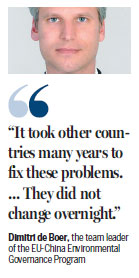Eco-expert calls for tough stance on pollution
After spending more than 14 years in China, environmental expert Dimitri de Boer sometimes forgets about the smog.
Yet the sight of the US State Department's air quality index for Beijing, or the sound of his children coughing, soon brings him back to reality.
"Previously I liked to open the windows to get some fresh air. But then I realized the air I was letting in might not be so fresh after all," said De Boer, who is the team leader of the multimillion-euro EU-China Environmental Governance Program, a cooperation scheme between the European Commission and the Chinese Ministry of Environmental Protection.
"There is no way that my children's coughing is a genetic issue because asthma is not a problem for me, my wife or our families. They clearly do not have healthy lungs, and that has got me really worried."
He maintains that insufficient research has been done into the effects of particulate pollution.
"Some people are very scared, some people do not care at all. The challenge is that people are not presented with the scientific figures on how air pollution could affect their health," he said, adding that this lack of information is also impeding government efforts to solve the problem.
De Boer believes greater effort should be expended on phasing out polluting industries and further upgrading the capital's energy structure.
"I still often smell burning coal on Beijing's streets," he said. "If I can smell it so easily, why can't others? It should not be so difficult to increase law enforcement on that."
Despite these issues, De Boer has noticed an improvement in air quality in recent years. This mirrors the Environmental Protection Ministry's figures, which show that 66.7 percent of days in the capital were "above average" for air quality in the first three months of this year.
"It took other countries many years to fix these problems. Cities like Los Angeles and London spent a long time finding a solution. They did not change overnight," De Boer said.



















